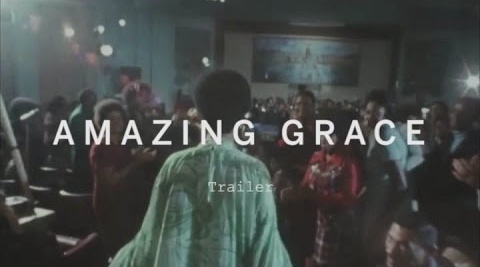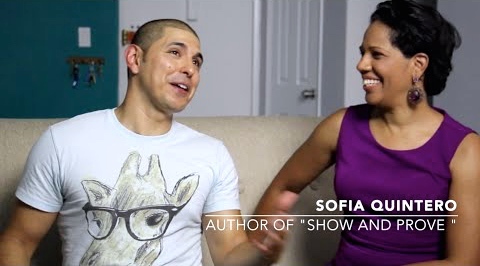Mark Anthony Neal's Blog, page 705
August 20, 2015
Say Amen Somebody! Documentary of Aretha Franklin's 'Amazing Grace' to Premiere at Toronto International Film Festival
 'The late director Sydney Pollack's behind-the-scenes documentary about the recording of Aretha Franklin's best-selling album
Amazing Grace
finally sees the light of day more than four decades after the original footage was shot.' +TIFF Trailers
'The late director Sydney Pollack's behind-the-scenes documentary about the recording of Aretha Franklin's best-selling album
Amazing Grace
finally sees the light of day more than four decades after the original footage was shot.' +TIFF Trailers
Published on August 20, 2015 14:32
Big Think: How Amazon’s Algorithm Gets You to Spend Money
 'Companies like Amazon take advantage of the fact that they know a whole lot more about buying patterns than you do. As author and entrepreneur Jerry Kaplan explains, this sort of information asymmetry is the real crux of their business plan. Jerry Kaplan's latest book is Humans Need Not Apply: A Guide to Wealth and Work in the Age of Artificial Intelligence' -- +Big Think
'Companies like Amazon take advantage of the fact that they know a whole lot more about buying patterns than you do. As author and entrepreneur Jerry Kaplan explains, this sort of information asymmetry is the real crux of their business plan. Jerry Kaplan's latest book is Humans Need Not Apply: A Guide to Wealth and Work in the Age of Artificial Intelligence' -- +Big Think
Published on August 20, 2015 12:53
Moogfest 2016 Comes to Durham, NC
 'Moogfest the internationally acclaimed festival of music, art and technology -- will debut in Durham, NC May 2016. This announcement signals a long-term commitment by festival organizers, reinforcing the exploding technology scene and culture of innovation in the Triangle.'
'Moogfest the internationally acclaimed festival of music, art and technology -- will debut in Durham, NC May 2016. This announcement signals a long-term commitment by festival organizers, reinforcing the exploding technology scene and culture of innovation in the Triangle.'
Published on August 20, 2015 05:41
#TheRemix: Krip Hop Nation Co-Founder Leroy Franklin Moore on Hip-Hop and Disability
 'Rapper, educator and activist
Leroy Franklin Moore
performs and lectures about the intersections of race and disability. Born in New York City with cerebral palsy, Moore is co-founder of Krip Hop Nation, a project which came out of his interest in black musicians who were marginalized because of their disabilities. Moore joined
#TheRemix
host James Braxton Peterson to talk about his activism.'
'Rapper, educator and activist
Leroy Franklin Moore
performs and lectures about the intersections of race and disability. Born in New York City with cerebral palsy, Moore is co-founder of Krip Hop Nation, a project which came out of his interest in black musicians who were marginalized because of their disabilities. Moore joined
#TheRemix
host James Braxton Peterson to talk about his activism.'
Published on August 20, 2015 05:25
August 18, 2015
The Foreign Exchange -- "Asking For A Friend" (Official Video)
 Music and visuals for "Asking for a Friend"--lead single from
Foreign Exchange's
Tales from the Land of Milk and Honey. Directed by
Kenneth Price
.
Music and visuals for "Asking for a Friend"--lead single from
Foreign Exchange's
Tales from the Land of Milk and Honey. Directed by
Kenneth Price
.
Published on August 18, 2015 11:02
Metastases of Performance: Ubiquity, Marginality, Virtuosity -- Lecture by Tavia Nyong'o
 'Tavia Nyong'o, cultural critic and professor of Performance Studies at NYU presents
"Metastases of Performance: Ubiquity, Marginality, Virtuosity,"
where he discusses the proliferation of performance throughout our digital culture.' -- Duke Franklin Humanities Institute
'Tavia Nyong'o, cultural critic and professor of Performance Studies at NYU presents
"Metastases of Performance: Ubiquity, Marginality, Virtuosity,"
where he discusses the proliferation of performance throughout our digital culture.' -- Duke Franklin Humanities Institute
Published on August 18, 2015 10:53
August 17, 2015
Straight Outta Compton: Shameless Misogyny & the Complexity of White Supremacy by Lawrence Ware
 Straight Outta Compton: Shameless Misogyny and the Complexity of White Supremacyby Lawrence Ware | @Law_Ware | NewBlackMan (in Exile)
Straight Outta Compton: Shameless Misogyny and the Complexity of White Supremacyby Lawrence Ware | @Law_Ware | NewBlackMan (in Exile)Straight Outta Compton is a good movie. The acting is not great, but it does not distract from the narrative. The pacing of the film does not draw attention to its 150-minute length. The use of single take tracking shots shows that F. Gary Gray is a filmmaker that has come into his own and is willing to experiment. The cinematographer is painterly in the framing and lighting.
If this were a biopic about a white group with this kind of impact upon America, the film would be considered worthy of Oscar consideration. We will see if SOC gets any serious recognition. I suspect it will not. Oscar voters largely ignored Beyond the Lights, but if it had been about white characters in a different musical genre, GuGu Mbatha-Raw would have been a serious contender for Best Actress.
Straight Outta Compton is a very good film, but this is not a review. Instead, I want to discuss what it gets right and, more egregious, what it gets wrong.
What It Gets Right: The Complexity of White Supremacy
White supremacy plays a central role in the film. How police officers treat the group is centered in white supremacy. The reaction of white, middle class conservatives betrays a form of white supremacy. The FBI’s attempt to censor the group is grounded in white supremacy. Like in America, white supremacy is ubiquitous in the film. However, it is the white supremacy displayed by a character that considers himself an ally to the group that fascinated me.
Paul Giamatti is convincing as Jerry Heller, the shrewd manager of N.W.A. and co-founder of Ruthless Records. A central point of conflict is the mismanagement of money by Heller and Eazy-E, played effortlessly by Jason Mitchell. In a climatic scene, after N.W.A. has broken up and Eazy-E discovers that his trusted manager took advantage of him financially, Heller says tearfully, “I always took care of you. Didn’t I always take care of you? Yes, I made sure I was taken care of first, but I always took care of you.” All he needed to do was add “boy” at the end of those sentences.
Heller saw himself as enlightened—an ally to this group of working class black men from Compton, California. He was outraged early in the film by black suffering at the hands of the police. He appeared to genuinely believe in the talent and message of the group. He put himself and his career at risk to promote and protect them. Yet, despite all this, he still saw these black men through the lens of white supremacy.
He took advantage of the group financially. He infantilized them. And when confronted about his financial transgressions, he spoke to Eazy-E in a way reminiscent of a slave owner addressing a house n*gger. Many assume that racism must be overt in order to be present. Heller shows us that racism can be expressed in a multiplicity of ways.
What It Gets Wrong: Misogyny
Films about historical figures are political statements. What filmmakers choose to include is just as important as what they choose to exclude. Let’s look at what SOC unnecessarily includes: scene after scene of nude black women sexually gratifying men. (Both fair and dark skinned black women are featured. Those outraged by the colorism in the casting call only succeeded in ensuring that women of all shades are objectified.) Female characters are used for sex and discarded. They are used as eye pleasing décor in party scenes. Women wear revealing clothing for purposes that neither serve the narrative nor communicate anything distinctive about the characters they portray.
The ingenuity with which words are used to degrade women is almost impressive in its profligacy. The film is misogynistic in what it includes, but it is more misogynistic in what it excludes.
There are no references to the abuse women suffered at the hands of N.W.A.—most pointedly, at the hands of Dr. Dre. There is no mention of the incident involving Dr. Dre and Dee Barnes when, in 1991, she reported that he “began slamming her face and the right side of her body repeatedly against a wall near the stairway” and “grabbed her from behind by the hair and proceeded to punch her in the back of the head” at a party.
Nor does the film show the abuse suffered by his ex-fiancé, the singer Michel’le. She reported in an interview that, “I had five black eyes; I have a cracked rib; I have scars that are just amazing.” Michel’le is barely mentioned, and when she is, it is only as an artist on Death Row Records. Dr. Dre is portrayed as a forward thinking musical genius. There is no mention of his abusive behavior. For him, the film borders on hagiography, and that is simply irresponsible.
As I’ve said before, I have a great deal of affection for N.W.A. Many do. But our love for musical artists should not blind us to their misdeeds.
This is a good film. It is well made and insightful about the complexity surrounding expressions of white supremacy. However, it ignores the voices of black women suffering just outside the frame of the film, and that I cannot excuse.
+++
Lawrence Ware is a professor of philosophy and diversity coordinator for Oklahoma State University’s Ethics Center. A frequent contributor to the publication The Democratic Left and contributing editor of the progressive publication RS: The Religious Left, he has also been a commentator on race for the HuffPost Live, CNN, and NPR.
Published on August 17, 2015 19:56
During Segregation, A Mountain Oasis Gave Black Families A Summer Escape
 NPR's Code Switch recalls Lincoln Hills, the only mountain resort west of the Mississippi where African-Americans could buy land or rent cabins. It was founded in the mid-1920s in the Rocky Mountains at a time when the Ku Klux Klan was prominent in Colorado.
NPR's Code Switch recalls Lincoln Hills, the only mountain resort west of the Mississippi where African-Americans could buy land or rent cabins. It was founded in the mid-1920s in the Rocky Mountains at a time when the Ku Klux Klan was prominent in Colorado.
Published on August 17, 2015 12:11
#ProjectBronx: Talking 'Show & Prove' with Sofia Quintero
 '+ProjectBronx's Host Adam Levine-Peres interviews Bronx born author
Sofia Quintero
on her latest novel titled Show and Prove, which is set in the South Bronx (Mott Haven) during the 1980's. The story is told through the perspective of 2 young men growing up during the early Hip-Hop era. One is African-American and the other is Puerto Rican.'
'+ProjectBronx's Host Adam Levine-Peres interviews Bronx born author
Sofia Quintero
on her latest novel titled Show and Prove, which is set in the South Bronx (Mott Haven) during the 1980's. The story is told through the perspective of 2 young men growing up during the early Hip-Hop era. One is African-American and the other is Puerto Rican.'
Published on August 17, 2015 06:42
August 16, 2015
Charlayne Hunter Gault on the Life of Julian Bond
 'PBS Correspondent Charlayne Hunter Gault reflects on the life of Julian Bond, whom she knew as the first Black student to attend the University of Georgia in 1961.' -- +PBS NewsHour
'PBS Correspondent Charlayne Hunter Gault reflects on the life of Julian Bond, whom she knew as the first Black student to attend the University of Georgia in 1961.' -- +PBS NewsHour
Published on August 16, 2015 20:14
Mark Anthony Neal's Blog
- Mark Anthony Neal's profile
- 30 followers
Mark Anthony Neal isn't a Goodreads Author
(yet),
but they
do have a blog,
so here are some recent posts imported from
their feed.



